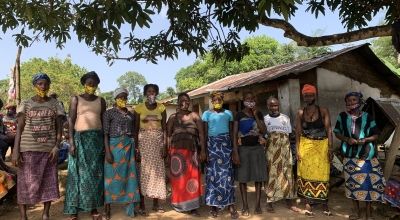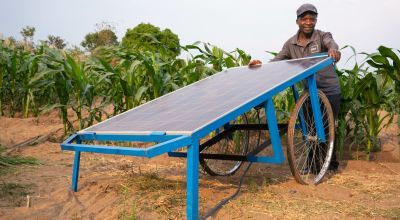
Read our 2024 annual report

Knowledge Hub
Many of us do not think about how our dinner gets to our plate, or how our lunch meal deal made it to supermarket shelves. But no matter what you are eating, there is one vital component to all of the food we eat - water.
As well as making up over 50% of our bodies and covering the majority of the Earth’s surface, water produces our food and is key in supporting livelihoods. There is no food without water. However, water is not infinite, and many people across the globe do not have easy access to clean water for drinking and cooking.
Sustainable access to water can be the difference between failed crops and a bountiful harvest, or a diet rich in nutrients and hunger.
Here, we explain how a clean supply of water in a village in rural Kenya has allowed children to grow their own food, eat healthy meals, and even continue their education.
The impact of drought
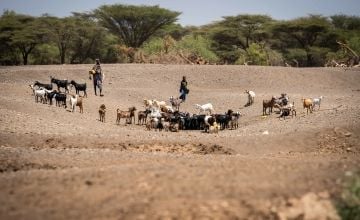
Since 2020, the Horn of Africa has been affected by a severe drought, resulting in five consecutive rainy seasons. This caused widespread malnutrition and hunger, livestock deaths, decimated livelihoods and failed crops. In Kenya alone, over 5 million people were faced with acute food insecurity due to the drought.
Turkana County, Kenya’s largest county, is one of the areas of Kenya most affected by the drought. An ASAL (arid and semi-arid land) area, the majority of people in Turkana are employed in agriculture and pastoralism. When the rains failed, so did crops. Farmers were unable to harvest enough to feed their families, let alone sell at market. Prices of produce were driven up, leaving families struggling to buy what they needed. Meanwhile, pastoralists saw their entire livelihoods destroyed, as their livestock, unable to graze, died in large numbers.
While minimal rains have now fallen on Kenya, it is not enough for a full recovery. The communities in Turkana are starting from the beginning with their crops, or changing their livelihoods, or fearing the next climate shock. All of this while coping with a lack of access to water. In many areas, people - usually women or girls - must walk long distances to fetch water from rivers, with no guarantee that it is clean. This has a big impact on daily life. Without sufficient water, families are unable to irrigate their land, wash their hands, or cook a meal.
Rehabilitating water systems
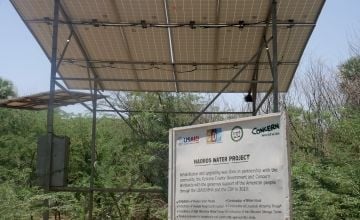
One of the many towns affected by this climate-induced drought in Turkana is an agriculture-reliant village called Naoros. Even when rains fell, it proved difficult to bounce back as the Naoros water system could not sustain the community. Farmers were forced to walk long distances with their livestock so they could graze at the river, while collecting water for farming and personal use was an arduous task.
This is where Concern came in. As part of our response to the drought, our team supported the rehabilitation of the Naoros water system, including a borehole. The borehole is powered by solar panels, and provides water for five days after being turned on.
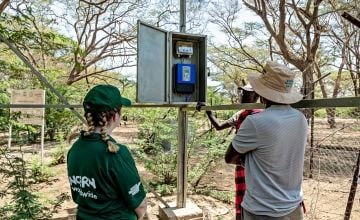
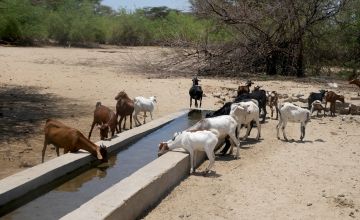
Gerald Mutinda, WASH Officer with Concern, explained: “When the water is very low, due to drought, it pumps water from the borehole to the farm. The control panel adjusts the level of water needed. Locals have been trained on how to use the control panel, and how to know when the water level is low.
"We also installed solar panels, so they can harness power for their community at zero cost. This is how they are coping with climate change in Turkana County.”
The water is treated with chlorine via a special pump, making it safe to drink. Animals that previously had nowhere to graze now graze at the trough, while the borehole sustains 460 households in the village.
How water leads to education
The borehole also sustains the population of Naoros Primary School. At this school, over 370 students are taught subjects like English, Maths, Science and PE. Unfortunately, drought and lack of an available water system caused issues for the students and the school. Without easy access to water, the staff could not prepare lunches for the children. This meant that many children only had a mixture of beans and maize to sustain them from the morning. As a result, many of them missed classes, or even dropped out of education. Others could not enrol as they had to help their parents with collecting water or other farm work.
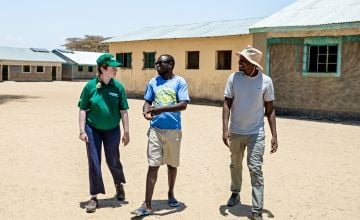
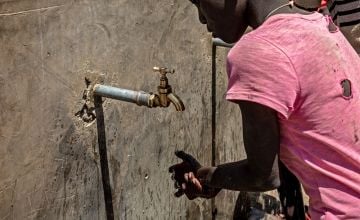
Joel Yatich, a teacher at Naoros Primary School, explained: “Without water in the school, it really affected the children and the entire school. We found that our meals will be delayed because of lack of water. At times, we had to send people to the river to fetch water to cook our meals. Children also had a problem when it came to water for drinking. They had no safe water for drinking.” Teachers had to boil river water to give to the students during the day.
Now, however, things are different. Concern has installed taps at Naoros Primary School, which allow the students and staff to wash their hands and maintain a high level of hygiene. The school now also has the water to cook food and provide lunches for the students. This has resulted in higher enrolment and less dropouts - meaning students stay in education longer, which leads to more opportunities in the long-term.
“It has done tremendous things to the school because things that were actually a problem have become easier because water is so plenty,” Mr Yatich, who has been teaching at the school for two years, said. “You can wash our hands, you can use it to wash clothes and the children have used it in the kitchen to cook their food and everything. It has simplified everything. I want to thank you from the community for giving water to this school.”
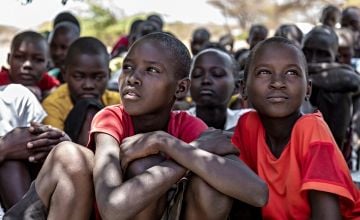
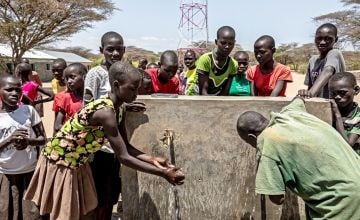
In addition, the school farm benefits from the new taps and borehole. Previously, the students were unable to grow anything as the soil had dried out due to drought. But now, they are growing herbs and plants like coriander and cowpeas. When we visited, the teachers proudly told us that the students’ third crop of cowpeas was flourishing. “The teachers have enjoyed greens from this place, which is rare,” Mr Yatich said.
A tap or a well may not seem like much. But water can change lives - whether that’s ensuring a family has enough water to drink, to irrigating a patch of land that can provide an income, to encouraging children to stay in school.
Golicha Dima, county programme manager in Turkana, said: “This is a WASH multipurpose scheme for people, fighting malnutrition, institutions, livestock and hygiene. By providing water, so many problems have been solved.”




